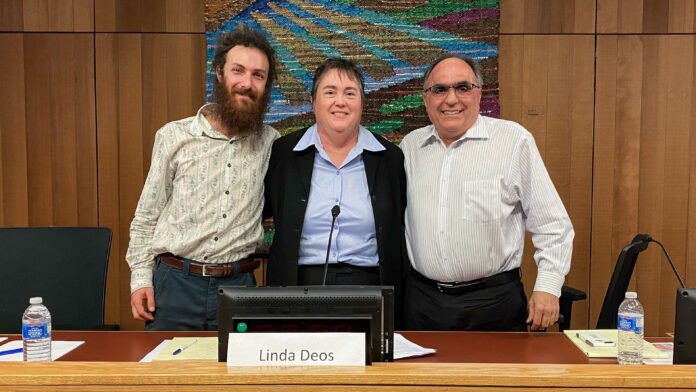Incumbent Jim Provenza, challengers Linda Deos and David Abramson, share policy views on issues from community
On Jan. 26, three candidates for the 4th District of the Yolo County Board of Supervisors, Linda Deos, David Abramson and incumbent Jim Provenza, shared their stances on a number of issues.
The Yolo County Board of Supervisors consists of five non-partisan members and is responsible for establishing county programs and setting annual budgets for departments.
Each supervisor is in office for four years.
Provenza is a lawyer and has served on the Board of Supervisors for three terms, since 2009. Deos also works in law and is a consumer protection attorney. Abramson is a climate researcher, small business owner and music teacher in the Davis community.
The main issues discussed included climate change, seniors, criminal justice reform, finance, land use and housing, interjurisdictional collaboration and water. These topics were chosen by the frequency in which they arose in the questions submitted by community members.
Questions regarding climate change were submitted the most, and all candidates support transitioning the county to clean energy within the next decade. Abramson, who is running on a plan to establish a local Green New Deal, spoke about his goals for Yolo County.
“The biggest problem we face is our economic system, which is fundamentally built on extraction and inequality,” Abramson said. “We need to rethink our economic system to become more localized and in-line with our planetary values.”
Deos, meanwhile, focused on the issue of climate change on a larger scale, sharing her hopes of Yolo County standing at the forefront of climate action.
“What Yolo County does is fabulous, and we can be a leader,” Deos said. “We can partner with [UC Davis] because they have the research ability to make this happen not just in Yolo County but worldwide. We can be the teachers for everybody.”
Affordable housing was another important topic. Provenza explained how the county can impact housing standards in Davis.
“Much of [the land around the city] is county land, and we are working in partnership with the city of Davis when they have a project to make sure county standards are met,” Provenza said. “One of those standards is protection of agricultural land. Another is that there is low-income housing.”
Abramson, who is a renter himself, brought up the problem of high rent costs in Davis, especially for students.
“People who are renters and students are doubly vulnerable because they don’t have the time to work enough to pay for an $1,800 apartment,” Abramson said. “It’s such a huge problem, and I don’t think we’ve had renter representation to the extent that we need.”
Provenza described how inter-jurisdictional collaboration between Davis, Yolo County and UC Davis has helped the affordability of the Davis housing market.
“We now have an enforceable agreement that the university will house 100% of its increased enrollment,” Provenza said. “That will do a tremendous amount to take the pressure off the Davis housing market so that when we build houses in Davis, we can build for everybody else, as well as for the students.”
Water conservation was emphasized as well. Provenza, who has worked on water policy during his entire time on the board, explained that groundwater levels are being conserved.
“Our Yolo conservancy has taken steps to limit the amounts of certain crops that are not conducive to protecting groundwater, such as vineyards and orchards, on a voluntary basis,” Provenza said.
Deos, however, believes groundwater conservation should be more strongly enforced at the county level.
“An issue we have is that it’s voluntary — as far our farmers taking groundwater out for their crops — versus Central Valley areas that are under stringent requirements to only take out so much,” Deos said.
Despite some disagreements, the candidates concurred often and shared similar views on the need to combat climate change and the lack of affordable housing in Davis. The election will be held on Mar. 3, 2020.
Written by: Eden Winniford –– city@theaggie.org





